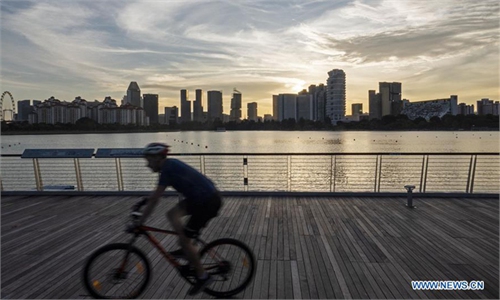
People dine inside a dome, an installation which helps prevent the spread of the COVID-19 epidemic, at Capitol Singapore Outdoor Plaza, Singapore, on Oct. 21, 2020. (Photo by Then Chih Wey/Xinhua)
The search volume for Singapore on China's largest online travel agency Trip.com soared 379 percent, after the Southeast Asian country lifted border restrictions for visitors from the Chinese mainland starting from Friday.
The searches mainly came from Beijing, Shanghai, Hangzhou in East China's Zhejiang Province and South China's Guangdong Province, Trip.com Group told the Global Times on Wednesday, adding that some people are keeping a watchful eye on air tickets and hotels in Singapore during the Chinese New Year in next February.
On October 29, Singapore announced plans to lift border restrictions for visitors from the Chinese mainland and the Australian state of Victoria starting from Friday, and they are not required to undergo the 14-day quarantine if they test negative for COVID-19 upon arrival at the airport.
The mainland has a set of comprehensive public health monitoring system and displayed successful control over the spread of the COVID-19 virus, said a statement by the Civil Aviation Authority of Singapore (CAAS), adding that over the past 28 days, the mainland had a virus local incidence rate of 0.00009 per 100,000, so the risk of importation from the mainland is very low.
"After keeping silent for nine months, Singapore has delivered an olive branch to Chinese tourists in a bid to drive its tourism recovery, as the Chinese market plays a vital role for Singapore," Ji Zhiying, a travel industry analyst at Beijing-based consulting and research firm Analysys, told the Global Times.
Last year, more than 3.6 million Chinese nationals visited Singapore, becoming the largest tourist source for a third consecutive year. Just in the first quarter of 2019, Chinese visitors contributed S$1.09 billion ($800 million) to the country, far more than the consumption of tourists from other destinations.
Thailand is also seeking to attract Chinese tourists via its Special Tourist Visa, and it is taking small steps to revive its vital tourism industry after it closed its borders in March to contain the coronavirus.
"Compared with Europe and North America, which are still suffering from the pandemic, the Asia-Pacific region will see a quicker and better tourism recovery due to its relatively successful containment of the virus," Ji noted, adding that the global tourism recovery is facing uncertainty due to the virus.
Last month, the Chinese Ministry of Culture and Tourism reaffirmed that China will continue the suspension of travel agencies' cross-border group tour services. The Ministry of Foreign Affairs also urged Chinese people to avoid cross-border travel amid the pandemic.




